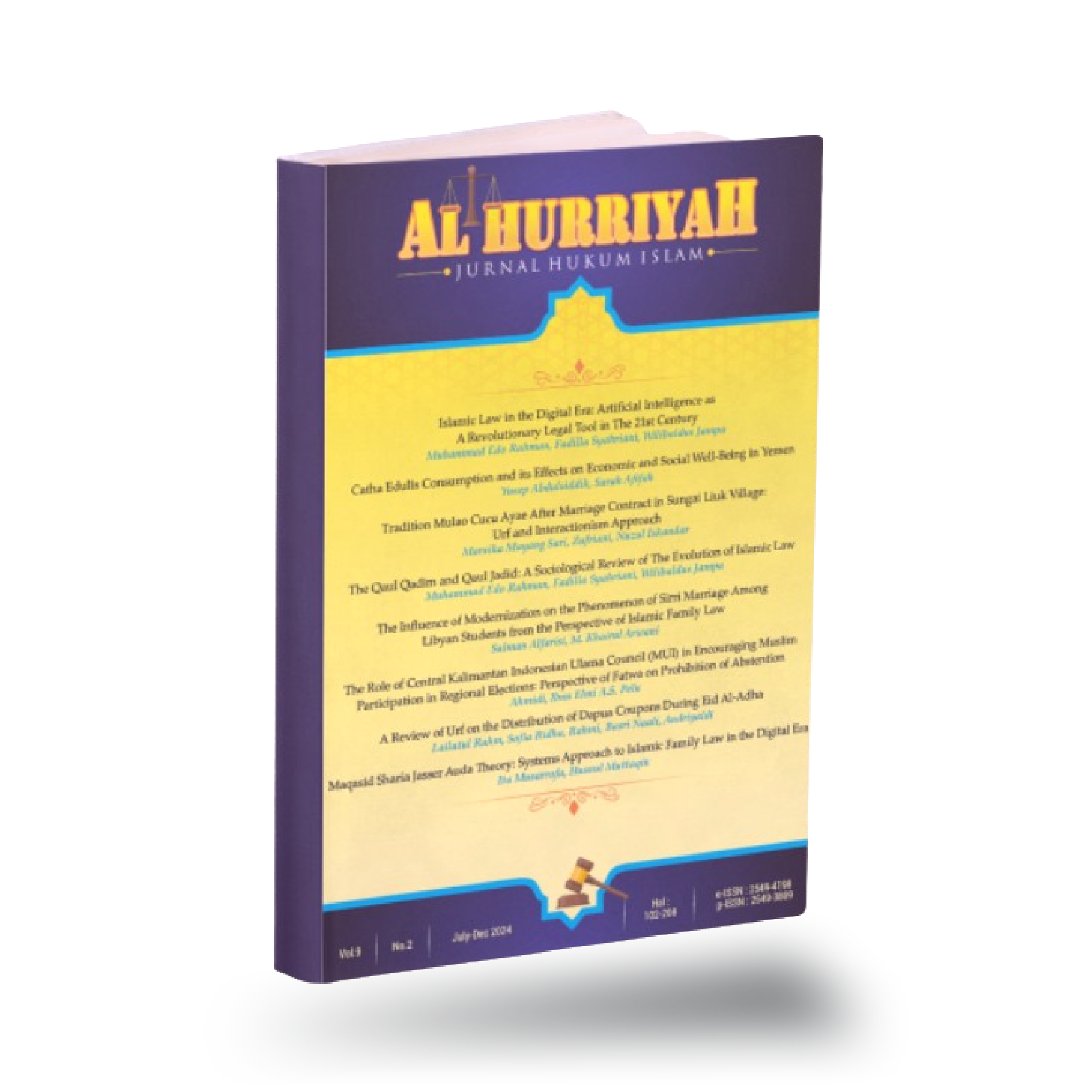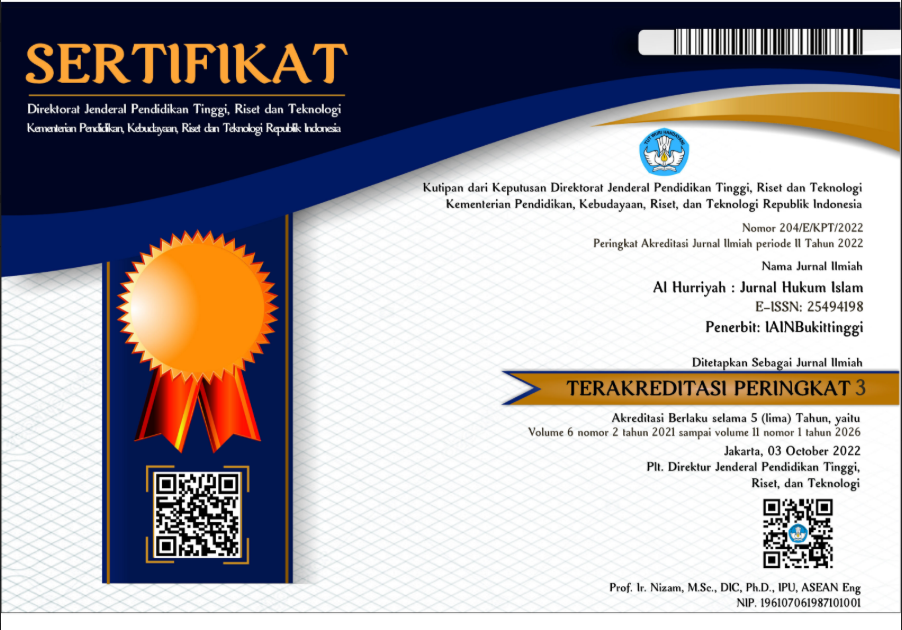Gender Discourse in Islamic Family Law Between Text and Context
DOI:
https://doi.org/10.30983/al-hurriyah.v10i1.8815Keywords:
Gender Equality, Islamic Law, Family RolesAbstract
Islam does not differentiate between men and women, skin color, or any other natural differences. In practice within society, women bear dual responsibilities such as cooking, washing, raising children, taking care of their husbands, and providing sexual services. In addition to earning a living and doing household chores, women also participate in activities. Women are viewed negatively if they neglect household responsibilities. Author's finding: that men only have one responsibility to earn a living, which certainly does not compare to women who do many things. This research uses literature study and qualitative field study. The findings and discussions include a review of qualitative research methods, literature studies, and field studies as a whole, or a combination of both. Furthermore, the data is analyzed using critical analysis techniques. The novelty in this research is "the ideal family relationship structure and gender equality through the cooperation of men and women." In families, gender partnership encompasses aspects such as the division of roles and tasks, transparency, accountability, and good governance. By following Islamic discourse, gender partnership can establish fair and equal gender relationship patterns in family life. This will prevent injustice or harm in the form of an inability to perform family duties.
References
Afifah, Farida Nur. “PENERJEMAHAN RAMAH GENDER Studi Atas Al-Qur ’ an Dan Terjemahannya Terbitan Kementerian Agama Edisi Penyempurnaan 2019.” Ṣuḥuf 14, no. 2 (2021): 313–50. https://doi.org/https//doi.org/10.22548/shf.v14i2.675.
Ainiyah, Qurrotul. Keadilan Gender Dalam Hukum Islam. Malang: Malang : Intrans Publishing, 2015.
Al-Biqa`i, Burhan al-Din Abi al-Hasan Ibrahim bin Umar. Burhan Al-Din Abi Al-Hasan Ibrahim Bin Umar Al-Biqa`i, Nadhm Al-Dhurar Fi Tanasub Al-Ayat Wa Al-Suwar. Juz VI. Beirut: Dar al-Kutub al-Ilmiyyah, 1996. https://archive.org/details/tafsir-qurthubi/Tafsir Qurthubi 01/.
Alfaizi, Muchammad Qosim. “Membangun Kesetaraan Gender Dalam Kehidupan Keluarga Perspektif Hukum Islam.” Jurnal Sains Dan Seni ITS 6, no. 1 (2017): 51–66. https://doi.org/https://doi.org/10.14421/jrh.v5i1.2383.
Aniqurrohmah, Syayidah Fitria Lulu’. “Kesetaraan Gender Dan Nilai Nilai Yang Terkandung Di Dalamnya Menurut Hak Asasi Manusia.” Jurnal Dunia Ilmu Hukum (JURDIKUM) 1, no. 2 (2023): 50–56. https://doi.org/10.59435/jurdikum.v1i2.170.
Ari Ganjar Herdiansah, Randi. “PERAN ORGANISASI MASYARAKAT (ORMAS) DAN LEMBAGA SWADAYA MASYARAKAT (LSM) DALAM MENOPANG PEMBANGUNAN DI INDONESIA.” SOSIOGLOBAL; Jurnal Pemikiran Dan Penelitian Sosiologi 1, no. 1 (2016): 49–67. https://doi.org/10.36701/nukhbah.v3i1.27.
Ciptyaningrum Wahyu, Endang. “Prinsip Kemitraan Gender Dalam Keluarga (Analisis Kesetaraan Gender Pada Keluarga Tukang Pijat Panggilan),” 2021. http://etheses.iainponorogo.ac.id/13068/.
Eisyi Latifah, Alharira, and Dudin Shobbaruddin. “Kesetaraan Gender Dalam Perspektif Al-Qur’an (Studi Komparatif Tafsir Ibnu Katsir Dan Al-Mishbah).” Tafahus: Jurnal Pengkajian Islam 2, no. 1 (2022): 74–84. https://doi.org/https://doi.org/10.58573/tafahus.v2i1.24.
Fauziah, Haniey, Elva Ronaning Roem, and Asmawi Asmawi. “Relasi Gender Suami Istri Yang Bekerja (Studi Kasus Pada Keluarga Pekerja Di Transmart Padang).” MUKADIMAH: Jurnal Pendidikan, Sejarah, Dan Ilmu-Ilmu Sosial 7, no. 2 (2023): 393–99. https://doi.org/https://doi.org/10.30743/mkd.v7i2.7433.
Haikal, Roqy, and Abd. Kholid. “ANALISIS INTERPRETASI GENDER DALAM AL-QUR’AN: KAJIAN ATAS BUKU ‘ARGUMEN KESETARAAN GENDER DALAM AL-QUR’AN’ KARYA NASARUDDIN UMAR.” Madaniyah 13, no. 2 (2023): 274–93. https://doi.org/https://doi.org/10.58410/madaniyah.v13i2.
Hakimul Fauzi, Hasanah Lillah Mudawwamah, M Fikrie Maulana Akbar Effendy. “Interpretasi Al-Qur’an Terhadap Feminisme Dan Gender Pada QS. Ali Imran Ayat 195 Dalam Perspektif Tafsir Tahlili Hakimul.” Jurnal Riset Agama 4, no. Agustus (2024): 108–24. https://doi.org/10.15575/jra.v4i2.34545.
Halimatussa’diyah. “TAFSIR KEBENCIAN Studi Bias Gender Dalam Tafsir Al-Qurān Karya Zaitunah Subhan.” Jurnal Ilmu Agama UIN Raden Fatah 16, no. 01 (2016): 141–61. https://doi.org/https://doi.org/10.19109/jia.v16i1.504.
Hamzah, Muhammad, and Muhammad Salsabila. “Pemberdayaan Perempuan Sebagai Hak Asasi Manusia.” JURNAL LOCUS : Penelitian & Pengabdian 3, no. 4 (2024): 343–56. https://doi.org/https://doi.org/10.58344/locus.v3i4.2567.
Herlinawati, Martha. “Yohana: Kesetaraan Gender Sebagai Kunci Keluarga Harmonis.” Antaranews.Com, 2019. https://www.antaranews.com/berita/1112696/yohana-kesetaraan-gender-sebagai-kunci-keluarga-harmonis.
Ichsan, Muhammad, and Erna Dewi. “Wanita Karir Dalam Tinjauan Maqashid Al-Shari’Ah.” Juris: Jurnal Ilmiah Syariah 19, no. 1 (2020): 45–58. https://doi.org/10.31958/juris.v19i1.2108.
Ilyas, H. Yunahar. “Perspektif Gender Dalam Islam, Pendekatan Tafsir Al-Qur’an Dan Kritik Hadis.” Mimbar: Jurnal Sosial Dan Pembangunan 17, no. 3 (2001): 238–51.
Ilyas Supena. Hermenutika Al-Qur’an Dalam Pandangan Fazlur Rahman. Jogjakarta, 2014. https://books.google.co.id/books/about/Hermeneutika_Alquran_dalam_pandangan_Faz.html?id=ZBPlrQEACAAJ&redir_esc=y.
Ismail, Zulkifli, Melanie Pita Lestari, Panti Rahayu, and Fransiska Novita Eleanora. “Kesetaraan Gender Ditinjau Dari Sudut Pandang Normatif Dan Sosiologis.” Sasi 26, no. 2 (2020): 154–61. https://doi.org/10.47268/sasi.v26i2.224.
Izad, Rohmatul. “Kesetaraan Gender Dalam Islam : Perspektif Hermeneutika Muhammad Syahrur.” Hermeneutik: Jurnal Ilmu Al Qur’an Dan Tafsir 12, no. 02 (2018): 13–31. https://doi.org/10.1234/hermeneutik.v13i1.6076.
Janah, Nasitotul. “TELAAH BUKU ARGUMENTASI KESETARAAN GENDER PERSPEKTIF AL-QUR ’ AN KARYA NASARUDDIN UMAR Nasitotul Janah J Anah Abstrak.” SAWWA 12, no. April (2017): 167–86. https://doi.org/http://dx.doi.org/10.21580/sa.v12i2.1707.
K, Abd. Halim. “KONSEP GENDER DALAM AL-QURAN (Kajian Tafsir Tentang Gender Dalam QS. Ali Imran [3]:36)” 7, no. 1 (2014): 1–16. https://www.neliti.com/publications/285726/konsep-gender-dalam-al-quran-kajian-tafsir-tentang-gender-dalam-qs-ali-imran-336.
Lestar, Puji. “PERANAN DAN STATUS PEREMPUAN DALAM SISTEM SOSIAL.” DIMENSIA: Jurnal Kajian Sosiologi 5, no. 1 (2015): 45–60. https://doi.org/https://doi.org/10.21831/dimensia.v5i1.3439.
Maulida, Hanifa. “Perempuan Dalam Kajian Sosiologi Gender: Konstruksi Peran Sosial, Ruang Publik, Dan Teori Feminis.” Journal of Politics and Democracy 1, no. 1 (2021): 71–79. https://doi.org/10.61183/polikrasi.v1i1.6.
Meijer, Albert. “Konsep Keadilan Gender Perspektif Mansour Fakih Dan Relevansinya Dalam Pendidikan Sosial Skripsi” 2012, no. August (2013): 32.
Nazah, Farida Nurun. “Posisi Perempuan Menurut Perspektif Kompilasi Hukum Islam Di Indonesia (Kajian Gender Dan Feminisme).” Jurnal Ilmiah Hukum Dan Keadilan 7, no. 2 (2020): 271–90. https://doi.org/https://doi.org/10.59635/jihk.v7i2.55.
Noor, Noer Huda. “Kesetaraan Dan Keadilan Gender Perspektif Al-Qur’an.” Jurnal Sipakalebbi’ 1, no. 1 (2013): 113–64. https://doi.org/https://doi.org/10.24252/jsipakallebbi.v1i1.288.
Nuraida, Nuraida, and Muhammad Zaki. “Pola Komunikasi Gender Dalam Keluarga.” Wardah 18, no. 2 (2018): 181. https://doi.org/https://doi.org/10.19109/wardah.v18i2.1780.
Nuraini, Shinta. “Al-Quran Dan Penciptaan Perempuan Dalam Tafsir Feminis.” Hermeneutik 12, no. 1 (2019): 71. https://doi.org/10.21043/hermeneutik.v12i1.6023.
Nurrahman, Panji. “Membangun Kesetaraan Gender Dalam Keluarga Pasangan Pekerja.” Jurnal Harkat Media Komunikasi Gender 18 (2) (2022): 47. https://doi.org/https://doi.org/10.15408/harkat.v18i2.26289.
Pemerintah Pusat. “UU Nomor 12 Tahun 2012,” 2012. https://peraturan.bpk.go.id/Details/207944/uu-no-12-tahun-2022.
Puspitawati, Herien. Gender Dan Keluarga. IPB Press. Bogor: IPB Taman Kencana, 2012.
Ratnasari, Dwi. “Gender Dalam Perspektif Al-Qur’an.” Jurnal Humanika 8, no. 1 (2018): 1–26. https://doi.org/10.35905/almaiyyah.v8i1.311.
Ropiah, Siti. “MEMBANGUN POLA RELASI KELUARGA BERBASIS KESETARAAN DAN KEADILAN GENDER.” Muwazah 7, no. 2 (2016): 1–2. https://doi.org/:https://doi.org/10.28918/muwazah.v7i2.515.
Runjani, Dwi. “Pandangan Hukum Islam Terhadap Wanita Karir.” El-Wasathiya: Jurnal Studi Agama, 2018. https://doi.org/https://doi.org/10.5281/zenodo.3523061.
Sabela, Aprilyawati. “Relevansi Pemikiran Kesetaraan Gender R.A. Kartini Dengan Konsep Feminisme Dalam Perspektif Pendidikan Islam.” IAIN KUDUS, 2023. http://repository.iainkudus.ac.id/id/eprint/10642.
Sukma, Vanesa. “Konstruksi Sosial : Jurnal Penelitian Ilmu Sosial Perbedaan Pria Dan Wanita Sebagai Sesama Manusia Dan Sesama Makhluk.” Konstruksi Sosial: Jurnal Penelitian Ilmu Sosial 4, no. 2 (2024): 72–79. https://doi.org/http://dx.doi.org/10.56393/konstruksisosial.v4i2.2455.
Syifa Salsabila, Shabrina, Muh Kadafi, and M Thahir Maloko. “Pengaruh Perubahan Sosial Terhadap Peran Gender Dalam Masyarakat Di Kecamatan Manggala Kota Makassar Perspektif Hukum Islam.” Madani : Jurnal Ilmiah Multidisiplin 2, no. 1 (2024): 111–17. https://doi.org/https://doi.org/10.5281/zenodo.10497603.
Wargianto, Dendik. “GENDER DALAM AL-QUR’AN (Kajian Tafsir Ayat-Ayat Gender Dalam Kisah Nabi Ādam As).” Institut Agama Islam Negeri Ponorogo., 2020.
Wartini, Atik. “Tafsir Feminis M. Quraish Shihab: Telaah Ayat-Ayat Gender Dalam Tafsir Al-Misbah.” Palastren 6, no. 2 (2013): 473–94. https://doi.org/http://dx.doi.org/10.21043/palastren.v6i2.995.
Zulaiha, Eni. “Tafsir Feminis: Sejarah, Paradigma Dan Standar Validitas Tafsir Feminis.” Al-Bayan: Jurnal Studi Ilmu Al- Qur’an Dan Tafsir 1, no. 1 (2016): 17–26. https://doi.org/10.15575/al-bayan.v1i1.1671.
Downloads
Published
How to Cite
Issue
Section
Citation Check
License
Copyright (c) 2025 Erna Dewi, Syamsiyah Nur, Badai Hasibuan, Muhammad Ichsan

This work is licensed under a Creative Commons Attribution-ShareAlike 4.0 International License.
Authors who publish with this journal agree to the following terms:
- Authors retain copyright and grant the journal right of first publication with the work simultaneously licensed under a Creative Commons Attribution-ShareAlike 4.0 International License that allows others to share the work with an acknowledgment of the work's authorship and initial publication in this journal.
- Authors are able to enter into separate, additional contractual arrangements for the non-exclusive distribution of the journal's published version of the work (e.g., post it to an institutional repository or publish it in a book), with an acknowledgment of its initial publication in this journal.
- Authors are permitted and encouraged to post their work online (e.g., in institutional repositories or on their website) prior to and during the submission process, as it can lead to productive exchanges, as well as earlier and greater citation of published work (See The Effect of Open Access).





